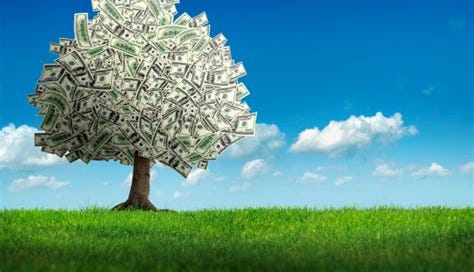How many times growing up did you hear the expression, “Money doesn’t grow on trees?”
For most American households, that is true.
As for the “paper” money itself, that is also true. At least in America where our bills are made of 75% cotton and 25% flax.
But, when it comes to countries, or the world, you have to believe that money is either finite, or infinite.
If it is finite, we should all be extremely concerned that people like Jeff Bezos could corner the market and dictate our lives. (If your home is smart, this may already be the case.)
If it is infinite, then we should behave as such, give everyone a beneficent living wage - and then some - and watch as Bezos becomes a bazillionaire but the rest of us don’t care because we have just what we need to live a life without financial concerns. Instead of beating our brains out trying to get ahead, or living a soulless existence in a cubicle, we follow our bliss while continuing to buy his books, electronics and tchotchkes. It’s a win/win for robber barons and ne’erdowells like me.
When discussing the pandemic relief monies this past spring, Ted Cruz, who has plenty of money, probably seven figures, said in regards to the idea of providing individuals with a $2,000 check:
Why be so cheap?” Cruz asked. “Give everyone $1 million a day, every day, forever. And three soy lattes a day. And a foot massage. We have a magic money tree — we should use it!
Oooooo, Ted “Scrooge” Cruz we should call him. He wears facetiousness so well.
So, let’s go along with the money prudes like Ted Cruz and assume money is finite.
If so:
On a planet of nearly 8 billion people, we should not be allowing it to “pool” in just a - relatively - few places. And “pool” it does.
Robert Reich has pointed out numerous times that, since the pandemic started, billionaires are accruing money many times faster than they could ever spend it. Hell, the interest on their monies is accruing many times faster than they can spend it. Their stock is accruing many times faster than they, their families, their families’ families and so on could ever spend it. There is even talk of soon-to-be trillionaires. (Funny. Spell check doesn’t seem to think that is a ‘word’.)
Meanwhile, thirty thousand people queue up in a vehicle lineup for a food bank in Tarrant County, Texas. And, yes, I know. You look at those $50,000 pick ups in those lineups and, you think, well, maybe Americans aren’t so smart about money. But, that’s also the recipe for why the rich should be happy to give away their money, or have a minor portion of their riches redistributed, because trickle-down economics doesn’t work worth shit, but trickle-up economics sure as hell does.
Even Mark Cuban thinks so.
If money is finite, we should be a lot more careful about waste.
More than half of what America spends every year goes to military spending. And that’s only the monies they are willing to tell us about. You read about the wasteful spending in the military on a somewhat regular basis but most Americans just shrug because - “America! Fuck yeah!” - and it’s all just yada yada yada. It’s the price of freedom and all that.
But the waste is egregious.
I got a tiny glimpse of it once because a former employee became a requisition officer for one of the branches. He called me up once from somewhere in the south Pacific and wanted to know the cost of glue. The kind of glue I could purchase through my River Supply supplier and, when I told him, he couldn’t believe how much the supplier he HAD to use was charging.
And that was just for glue.
The maintenance of our nuclear arsenal would bankrupt every nation on earth. Is it still necessary? Uhhhh, hard to say, but we continue to pay for it. Along with every other “toy” dangled before the committees that decide we will have the political will for shiny militaristic things and therefore the money to buy them.
If the money is finite, unless the American oligarchy steps in, to operate, build and maintain everything, at some point, we are going to be up a creek without a paddle. A nation of indentured servants, buckling roads, collapsing bridges and ill-equipped emergency rooms triaging patients even more so than they are now.
Wouldn’t it just be better for all involved to declare money infinite? Or, more or less, obsolete as in the Star Trek universe?
In an article about the economics of Star Trek the author admits that there is some exchange of currencies or credits, and there is mention of ownership, but members of the Federation are indifferent about how much something is because they know they have enough. They don’t try to accrue things because conspicuous consumption is unnecessary. Robots do what people don’t want to do (we are already headed in that direction), people do what gives them purpose and if that is nothing, that’s fine.
If robots do all the dirty work, and the US is hugely rich, does every single person really need a job? Are we going to let all of that money pile up in the 0.1% ruling elite, or can it be distributed to everyone? Does wealth being distributed to the people in an equal manner mean communism absolutely? Of course it doesn’t. The US isn’t communist. The UK isn’t communist. Denmark isn’t communist. What happens when the surplus is more than enough?
I know. We are centuries away from this sort of mental evolution. We can’t even get half of the American populace to wear a mask, believe there is a virus loose amongst us that does not have political leanings or accept the cleanest run election in the history of the country despite one political party refusing to support legislation designed to do just that.
America’s a mess.
But we were a mess at the LAST turn of the century. And - eventually - what came of all that was FDR’s New Deal.
Keep the faith.
###
Wow. You want fantastic, curated music for your Sunday mornings? I highly recommend listening to Sundays with Java Jim, one-time Orion guide who came to river running after climbing for the majority of his life. See? He’s pretty smart. Check it out and, while you are at it, support public radio with a donation.
Here’s a sample of what you might hear. The Joy of Nothing:
Also, AAR Dallas Silva says Apple TV's documentary series called “Home” is a must-see. The series explores just what makes a ‘home’ and, to do so, wanders to all corners of the earth to find a variety of examples - from Bali to Sweden to Austin, Texas. I plan on checking it out soon. Dallas says to allow time for binge-watching.
Thanks, as always, for reading and coming along for the ride. - JLM






